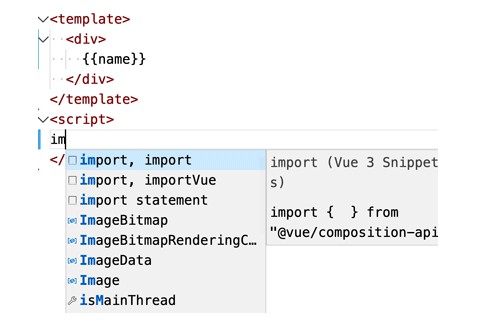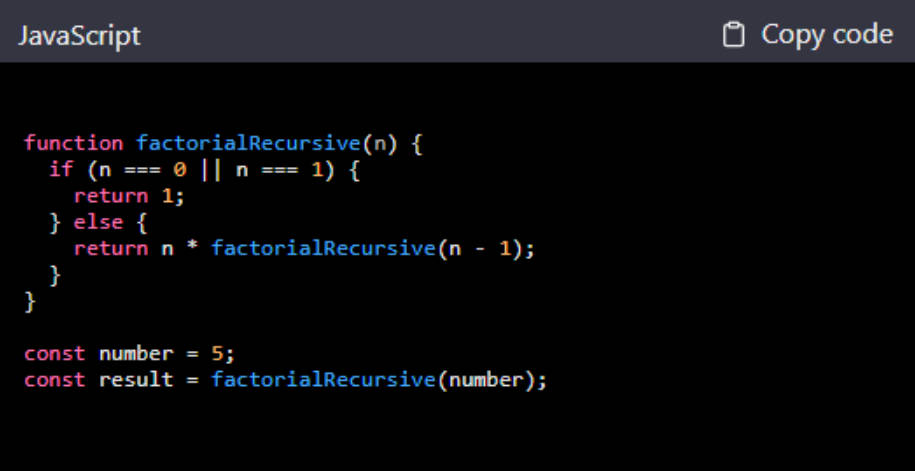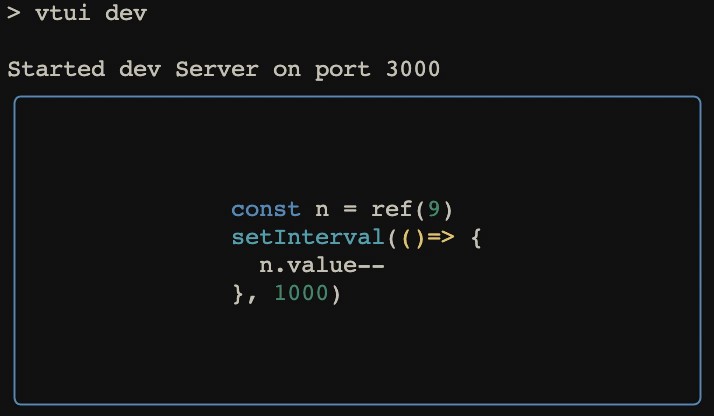vue-snippets
Vue3 Snippets, This extension adds Vue3 Code Snippets into Visual Studio Code.

Snippets
Including most of the API of Vue3. You can type reactive, choose reactive, and press ENTER, then const data = reactive({...}) appear on the screen.
插件的 Snippets 如下表格所示,比如你可以键入 reactive 然后按上下键选中 reactive 再按 Enter 键,就输入了const data = reactive({...})了。
| Prefix | JavaScript Snippet Content |
|---|---|
import |
import {...} from "@vue/composition-api" |
import |
import {...} from 'vue' |
newVue |
newVue({...}) |
createComponent |
createComponent({...}) |
export |
export default { ... } |
setup |
setup(${...}) {...} |
reactive |
const data = reactive({...}) |
watch |
watch(..., ...) |
watchFn |
watch(() => {...}) |
computed |
computed(() => { get: () => {...}, set: () => {...}}) |
toRefs |
toRefs(...) |
ref |
ref(...) |
props |
props(...) |
onBeforeMount |
onBeforeMount(...) |
onMounted |
onMounted(...) |
onBeforeUpdate |
onBeforeUpdate(...) |
onUpdated |
onUpdated(...) |
onBeforeUnmount |
onBeforeUnmount(...) |
onUnmounted |
onUnmounted(...) |
onErrorCaptured |
onErrorCaptured(...) |
Vue Composition API
@vue/composition-api 使开发者们可以在 Vue 2.x 中使用 Vue 3.0 引入的基于函数的逻辑复用机制。
Installation
npm
npm install @vue/composition-api --save
yarn
yarn add @vue/composition-api
CDN
<script src="https://unpkg.com/@vue/composition-api/dist/vue-composition-api.umd.js"></script>
By using the global variable window.vueCompositionApi.
通过全局变量 window.vueCompositionApi 来使用。
Usage
You must install @vue/composition-api via Vue.use() before using other APIs:
在使用任何 @vue/composition-api 提供的能力前,必须先通过 Vue.use() 进行安装:
import Vue from 'vue';
import VueCompositionApi from '@vue/composition-api';
Vue.use(VueCompositionApi);
After installing the plugin you can use the Composition API to compose your component.
安装插件后,您就可以使用新的 Composition API 来开发组件了。
TypeScript
This plugin requires TypeScript version >3.5.1. If you are using vetur, make sure to set vetur.useWorkspaceDependencies to true.
To let TypeScript properly infer types inside Vue component options, you need to define components with createComponent:
请使用最新版的 TypeScript,如果你使用了 vetur,请将 vetur.useWorkspaceDependencies 设为 true。
为了让 TypeScript 正确的推导类型,我们必须使用 createComponent 来定义组件:
import { createComponent } from '@vue/composition-api';
const Component = createComponent({
// 启用类型推断
});
const Component = {
// 无法进行选项的类型推断
// TypeScript 无法知道这是一个 Vue 组件的选项对象
};
TSX
? An Example Repository with TS and TSX support is provided to help you start.
To support TSX, create a declaration file with following content in your project.
? 这里有一个配置好 TS/TSX 支持的示例仓库来帮助你快速开始.
要支持 TSX,请创建一个类型定义文件并提供正确的 JSX 定义。内容如下:
// file: shim-tsx.d.ts`
import Vue, { VNode } from 'vue';
import { ComponentRenderProxy } from '@vue/composition-api';
declare global {
namespace JSX {
// tslint:disable no-empty-interface
interface Element extends VNode {}
// tslint:disable no-empty-interface
interface ElementClass extends ComponentRenderProxy {}
interface ElementAttributesProperty {
$props: any; // specify the property name to use
}
interface IntrinsicElements {
[elem: string]: any;
}
}
}
Limitations
Ref Unwrap
Unwrap is not working with Array index.
数组索引属性无法进行自动的Unwrap:
Should not store ref as a direct child of Array:
不要使用 Array 直接存取 ref 对象:
const state = reactive({
list: [ref(0)],
});
// no unwrap, `.value` is required
state.list[0].value === 0; // true
state.list.push(ref(1));
// no unwrap, `.value` is required
state.list[1].value === 1; // true
Should not use ref in a plain object when working with Array:
不要在数组中使用含有 ref 的普通对象:
const a = {
count: ref(0),
};
const b = reactive({
list: [a], // a.count will not unwrap!!
});
// no unwrap for `count`, `.value` is required
b.list[0].count.value === 0; // true
const b = reactive({
list: [
{
count: ref(0), // no unwrap!!
},
],
});
// no unwrap for `count`, `.value` is required
b.list[0].count.value === 0; // true
Should always use ref in a reactive when working with Array:
应该总是将 ref 存放到 reactive 对象中:
const a = reactive({
count: ref(0),
});
const b = reactive({
list: [a],
});
// unwrapped
b.list[0].count === 0; // true
b.list.push(
reactive({
count: ref(1),
})
);
// unwrapped
b.list[1].count === 1; // true
Using reactive will mutate the origin object
reactive 会返回一个修改过的原始的对象
This is an limitation of using Vue.observable in Vue 2.
此行为与 Vue 2 中的 Vue.observable 一致
Vue 3 will return an new proxy object.
Vue 3 中会返回一个新的的代理对象.
watch() API
onTrack and onTrigger are not available in WatchOptions.
不支持 onTrack 和 onTrigger 选项。
Template Refs
✅ Support ❌ Not Supported
✅ String ref && return it from setup():
<template>
<div ref="root"></div>
</template>
<script>
export default {
setup() {
const root = ref(null);
onMounted(() => {
// the DOM element will be assigned to the ref after initial render
console.log(root.value); // <div/>
});
return {
root,
};
},
};
</script>
✅ String ref && return it from setup() && Render Function / JSX:
export default {
setup() {
const root = ref(null);
onMounted(() => {
// the DOM element will be assigned to the ref after initial render
console.log(root.value); // <div/>
});
return {
root,
};
},
render() {
// with JSX
return () => <div ref="root" />;
},
};
❌ Function ref:
<template>
<div :ref="el => root = el"></div>
</template>
<script>
export default {
setup() {
const root = ref(null);
return {
root,
};
},
};
</script>
❌ Render Function / JSX in setup():
export default {
setup() {
const root = ref(null);
return () =>
h('div', {
ref: root,
});
// with JSX
return () => <div ref={root} />;
},
};
If you really want to use template refs in this case, you can access vm.$refs via SetupContext.refs.
如果你依然选择在 setup() 中写 render 函数,那么你可以使用 SetupContext.refs 来访问模板引用,它等价于 Vue 2.x 中的 this.$refs:
⚠️ Warning: The
SetupContext.refswon't exist inVue 3.0.@vue/composition-apiprovide it as a workaround here.
⚠️ 警告:
SetupContext.refs并不属于Vue 3.0的一部分,@vue/composition-api将其曝光在SetupContext中只是临时提供一种变通方案。
export default {
setup(initProps, setupContext) {
const refs = setupContext.refs;
onMounted(() => {
// the DOM element will be assigned to the ref after initial render
console.log(refs.root); // <div/>
});
return () =>
h('div', {
ref: 'root',
});
// with JSX
return () => <div ref="root" />;
},
};
You may also need to augment the SetupContext when working with TypeScript:
如果项目使用了 TypeScript,你还需要扩展 SetupContext 类型:
import Vue from 'vue';
import VueCompositionApi from '@vue/composition-api';
Vue.use(VueCompositionApi);
declare module '@vue/composition-api/dist/component/component' {
interface SetupContext {
readonly refs: { [key: string]: Vue | Element | Vue[] | Element[] };
}
}
SSR
Even if there is no definitive Vue 3 API for SSR yet, this plugin implements the onServerPrefetch lifecycle hook that allows you to use the serverPrefetch hook found in the classic API.
import { onServerPrefetch } from '@vue/composition-api';
export default {
setup (props, { ssrContext }) {
const result = ref();
onServerPrefetch(async () => {
result.value = await callApi(ssrContext.someId);
});
return {
result,
};
},
};





